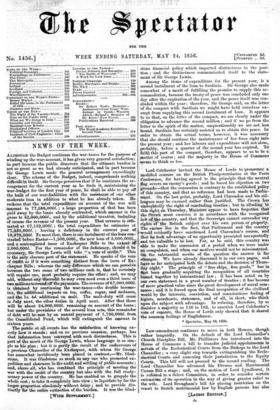NEWS OF THE -WEEK.
kralionaw the Midget continues the irir-texes for the purpose of winding up the war-account, it has given very general satisfaction; in part because the public discovers that the ultimate burden.is
not so great as we had already anticipated, and in part because Sir George Lewis made. the general arrangement -exceedingly clear. The scheme of the Budget, indeed, comprehends nothing difficult in itself. Sir George perceives that if he continues the ar- rangement for the current year as he finds it, maintaining the war-budget for the first year of peace, he shall.be able to pay off
the bulk of our war-liabilities with the assistaneenf one other moderate loan in addition to what he has already taken. He reckons that the total expenditure on account of the war will amount to 77,588,0001. ; a large proportion of that has been piiid away by the loans already' contracted, which amount in the gross to 42,000,0001;, and by the additional taxation, including of course the revenue of the present year. That revenue is esti-. mated at 67,152,0001. ; the total expenditure he estimates at 77,525,000/. ; leaving a deficiency in the current year of 10,873,0001. To meet that, there is one instalment of the loan con- tracted before Easter-1,000,0001, the new loan of 5,000,0001., and a contemplated issue of Exchequer Bills to the extent Of 2,000,000/. For the remainder of the deficiency, should it be necessary, Sir George Lewis will take " a vote of credit." This is the only obscure part of the statement. He speaks of the vote of credit as if it were something distinct from the issue of Ex- chequer Bills ; whereas the only difference which.we can perceive between the two sums of two millions each is, that he certainly will require one, most probably require the other ; and, we may add, without any discredit he may even need even a third issue of two millions to round off the payments. The revenue of 67,000,0001.
is obtained by continuing the war-taxes—the double income- tax, the additional imposts on tea, coffee, sugar, and molasses, and the ls. 4d. additional on malt. The malt-duty will cease in July next, the other duties in April next. After that there will be about 24,000,0001. remaining on account of the loans ; but under the provisions of the several loan acts, this remainder of debt will be met by an annual payment of 1,750,0001. from the Consolidated Fund, which will extinguish the amount in sixteen years.
The public at all events has the satisfaction of knowing ex- aetly how it stands ; and on no previous occasion, perhaps, has
that inforniation been conveyed with such distinctness. This is part of the merit of Sir George-Lewis, whose language is as sim- ple as his plan ; but it is partly the result of the endeavours bf a previous Chancellor of the Exchequer, with whom Sir George has somewhat invidiously been placed in contrast,—Mr. Glad- stone. It was Gladstone as much as any one who promoted ex- pedition and clearness in the audit and settling of public accounts ; and, above all, who has combined the principle of meeting the war with the credit of the country but also with the full ready- money power of the country. He has enabled us to grapple the whole cost ; to take it completely into view ; to liquidate by far the larger proportion absolutely without delay ; and to provide dis- tinctly for the entire extinction of the burden. It was the Glad-
stone financial policy which imparted distinctness to the posi- tion ; and the distinctness communicated itself to • the state- ment of Sir George Lewis.
Among the items of expenditure for the present year, is a second instalment of the loan to Sardinia. Sir George also made somewhat of a merit of fulfilling the promise to supply this ao- oommodation, because the treaty of peace was concluded only one day after the expiration of the year, and the peace itself was con- cluded within the year ; therefore, Sir George said, on the letter of the compact with Sardinia we might have held ourselves ex- empt from supplying this second instalment of loan. It appears to us that, on the letter of the compact, we are clearly under the obligation to advance the second million ; and if we go from the letter to the spirit of the matter, unquestionably we are not less bound. Sardinia has certainly assisted us to obtain this peace. In order' to obtain the actual terms, however, it was necessary that she should continue the maintenance of her force right into the present year ; and her labours and expenditure will not close, probably, before a quarter of the second year has expired.. To fulfil this part of the compact, therefore, appears to us to be a latter of course ; and the majerity in the House of Commons seems to think so too.


































